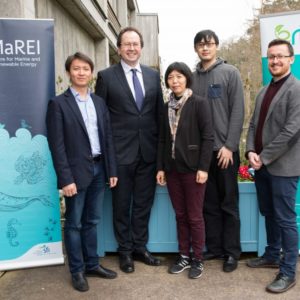
CHIMERA

- Title
-
CHIMERA – Multi-model innovations in Integrated Assessment Modelling of Global, Chinese, and Irish energy-economy-environment-climate systems investigating deep decarbonisation pathways from the Paris Agreement to the United Nations sustainable development goals
- Start Year
-
2018
- End Year
-
2022
- Funding body
-
Science Foundation Ireland and National Science Foundation of China
- Research Area
-
Energy Systems, Climate Change, Mitigation Pathways, Air Pollution, Sustainable Development Goals.
- Research partner/host
-
MaREI, the SFI Research Centre for Energy, Climate and Marine, Environmental Research Institute, UCC, Ireland.
- Project Partners
-
Institute of Energy, Environment and Economy, Tsinghua University, Beijing, Republic of China.
College of Environmental Sciences and Engineering, Peking University, Beijing, Republic of China.
- Principal Investigator
-
Prof Brian Ó Gallachóir, MaREI, University College Cork, Ireland. Prof Wenying Chen, Tsinghua University, China
- PhD Researchers
-
Siddharth Josh, MaREI, University College Cork, Ireland.
Vahid Aryanpur, MaREI, University College Cork, Ireland
Introduction
The Paris Agreement achieves global consensus on the ambition to limit anthropogenic climate warming to “well below 2°C” and to pursue efforts towards 1.5°C.
Integrated assessment models (IAMs) are a key methodological tool for systematically investigating long-term trade-offs between the energy system, the climate system, and the broader socio-economic systems. Such models play an important role in underpinning the scientific debate on climate change mitigation and adaptation options. Their results inform assessments by bodies such as the IPCC and feed directly or indirectly into advice taken up by national and international policymakers, industry, regulators, and citizens groups.
In this project, we investigate the ambitious Paris Agreement 1.5˚C goal, through novel integrated multi-model multi-scale coupling of detailed technology-rich energy systems models for China, Ireland, and the World.
We aim to outline the impacts of additional costs and trade-offs of rapid deep decarbonisation, and give critical insights into technology roadmaps and policy pathways on how the zero carbon transition to sustainability could affect societal sectors and household income groups.
We aim to quantify the impacts of a zero-carbon energy system upon local-air pollution, public health, water quality, climate damages, employment, and economic stimulus.
Work Packages
WP1 – TIMES-GEO
We will collaboratively develop a new state of the art global energy systems model, cognisant of spatial and temporal resolution weaknesses of current modelling approaches, one that is scientifically and thermodynamically consistent, with a structure that is optimal for linking to economy models, and that is fit for purpose for global policy analysis, assessment of nationally determined contributions, and that will contribute to the IPCC 6th assessment report.
WP2 – Energy Service Demand Projections Model
A key sensitivity underpinning how successful we will be in pursuing efforts to keep post-industrial temperature increase below 1.5˚C are the socioeconomic conditions that drive future sustainable development and energy systems models. Typically, energy systems models tend to focus on technological solutions with minimal sensitivity treatment of the socio-economic drivers. The future macroeconomic outlook is uncertain. Multiple social and demographic trend-breaks make traditional macroeconomic models unsuitable for forecasting future macroeconomic outlooks. For this reason, a new approach is required, which considers the level of uncertainty of the likely macroeconomic, socio-demographic trend drivers over the 21st century. The level of prosperity and energy service demands will be driven by demographic trends dictated by regional educational attainment, rates of urbanisation, institutional stability, energy system structure, sustainable and resilient practices, and a maturation of the global ability to collaborate and cooperate collectively towards a common goal, or to digress into t regional rivalry.
This work package will map the socioeconomic solution space to achieve the well below 2˚C scenarios (WB2CS) using the Shared Socioeconomic Pathways narratives. The SSPs consist of 5 data driven narratives which outline 5 differing potential futures with varying degrees of challenges to mitigation and adaptation. SSP1 describes a sustainable low growth in material consumption future, SSP2 describes a middle of the road future, SSP3 describes a fragmented global economy with regional rivalry, SSP4 describes an inequitable future with mitigation only in high income regions, and SSP5 describes a fossil fuel development future with little concern for global problems only focussing on local environment.
Detailed sectoral activities data consistent with the SSPs have been generated by OECD ENVLINKS CGE model which will drive the TIMES-GEO model in its initial calibration and harmonisation runs prior to hybridisation. We will develop an ecologically consistent energy service demand model consistent with the SSP narratives and benchmarked against current data and the SSP marker models. This will enable sensitivity analysis to explore the feasible solution space with reducing carbon budgets for feasible development pathways from TIMES-GEO pursuing a temperature limit of WB2C in each of the SSPs.
WP3 – IMED CGE
This work package will combine with outputs from WP1 and WP2 to develop the framework and data handling process pass data between TIMES-GEO and the top-down macroeconomic energy service demand framework to create a soft linked hybrid Integrated Assessment Model. This data handling framework is critical to ensure internal consistency between each model’s theoretical underpinnings and that the energy technology, energy flows, investment, and energy service demand data handling and transfer. This work package will enable initial scenario analysis utilising SSP narratives in conjunction with the hybrid model under carbon constraints and climate temperature constraints to develop regionally disaggregated policy pathways for the transition. Alongside climate mitigation transformation pathways, we will also explore air pollution and health impacts, key mitigation technologies, trade, international co-operation, the potential role of the One Belt and One Road policy in China.
WP4 – Scenario Analysis
This work will build on mitigation pathway analysis in WP3 to develop insights into key technological uncertainty, technological path dependency, and policy requirements at a regional level to develop mitigation technology portfolios with international collaborative R&D frameworks. Key technologies to be explored are negative emissions technologies such as bioenergy carbon capture and storage (BECCS), Direct Air Capture (DAC), Enhanced Weather (EW), and nascent path-dependent technologies, as well as small scale granular technologies with the potential for disruptive innovation and a step-change in energy demand.
WP5 – CHINA-TIMES
This work package will build a nested 30 region China-TIMES_30r energy system model incorporating provincial-level regions for local scale municipal planning in the global context. The baseline scenarios will aim to include health damage impacts from local air pollution, climate damages, and ecosystem service losses resulting from current climate change and environmental damages so that the mitigation scenarios may have a more scientifically rigorous counterfactual scenario to compare to, rather than the current business-as-usual economic projections without appropriate accounting of climate damage externalities to business, families and productive sustainable ecosystems.
WP6 – TIMES_IRELAND
This work package will develop a nested multiregional TIMES_Ireland3p0 energy system model incorporating county and city level regions for local scale municipal planning in the global context.
WP7 – IMPACTS
This work package aims to utilise the new modelling capacity and frameworks to explore the current grand challenges in energy systems analysis, mitigation policy, and sustainable development and to frame the analysis with maximum impact for stakeholder engagement. We envisage a new model for stakeholder engagement that is a fully participatory process enabling genuine citizen engagement in scientific and social dialogue. This analysis could include the assessment of the smoky coal ban in Ireland, and renewable penetration in Ireland. It could include also an analysis of the new coal quota laws in China to reduce coal consumption.
Research questions may include:
a) How can Ireland learn from China’s experience in energy technology innovation and diffusion?
b) How can China benefit from experiences in Ireland, such as the smoky coal ban, in developing coal consumption quotas for China?
c) How can China best learn from experiences in Ireland on increasing renewable electricity penetration?
WP8 – Communications and Outreach
Insure impact through the uptake of outputs and by maximising project visibility.
A project communication strategy will be developed, which will help to plan for targeted audiences and keep a record of dissemination activities and their impacts. It will include Education and Public Engagement (EPE) activities, workshops, industrial engagement, and transfer of researchers from Ireland and China. In order to disseminate all information as widely as possible, a range of media and activities will be used.
WP9 – Management and Planning
This project will also include a task for management and planning, with input from all researchers and project participants to ensure timeline project delivery. There shall be a monthly progress review between UCC, TU, and PKU.
Journal Papers
Global Energy Modelling Publications
- Siddharth Joshi, Shivika Mittal, Paul Holloway, Priyadarshi Ramprasad Shukla, Brian Ó Gallachóir, James Glynn. High resolution global spatiotemporal assessment of rooftop solar photovoltaics potential for renewable electricity generation. Nature Communications 12, 5738 (2021). https://doi.org/10.1038/s41467-021-25720-2
- Lei Yang; Jingcheng Shi; James Glynn; Brian Ó Gallachóir, Wenying Chen. 2021, Modelling low carbon transition and economic impact under SSPs and RCPs Based on GTIMES. Advances in Climate Change Research. doi.org/10.1016/j.accre.2021.09.002
- Brinkerink, M., Zakeri, B., Huppman, D., Glynn, J., O Gallachoir, B., Deane, P. (2021) Assessing global climate change mitigation scenarios from a power system perspective using a novel multi-model framework. Environmental Modelling and Software. DOI:10.13140/RG.2.2.35787.72485
- Seleshi G. Yalew*, Michelle TH van Vliet, David EHJ Gernaat, Fulco Ludwig, Ariel Miara, Chan Park, Edward Byers, Enrica De Cian, Franziska Piontek, Gokul Iyer, Ioanna Mouratiadou, James Glynn, Mohamad Hejazi, Olivier Dessens, Pedro Rochedo, Robert Pietzcker, Roberto Schaeffer, Shinichiro Fujimori, Shouro Dasgupta, Silvana Mima, Silvia R. Santos da Silva, Vaibhav Chaturvedi, Robert Vautard, Detlef P. van Vuuren. Impacts of climate change on energy systems in global and regional scenarios, Nature Energy, 2020 – www.nature.com/articles/s41560-020-0664-z 2020
- Realmonte, G., Drouet, L., Gambhir, A., Glynn, J., Hawkes, A., Köberle, A. C., & Tavoni, M. (2020). Reply to “High energy and materials requirement for direct air capture calls for further analysis and R&D.” Nature Communications, 11(1), 10–11. https://doi.org/10.1038/s41467-020-17204-6
- Realmonte Giulia, Drouet Laurent, Gambhir Ajay, Glynn James, Hawkes Adam, Köberle Alexandre C, Tavoni Massimo 2019 An inter-model assessment of the role of direct air capture in deep mitigation pathways. Nature Communications (DOI: 10.1038_s41467-019-10842-5)
- Winning, M., Ekins, P.,Glynn, J., McGlade, C., Price, J., Pye, S., Watson, J. 2019 Nationally Determined Contributions (NDCs) under the Paris Agreement and the costs of delayed action. Climate Policy https://doi.org/10.1080/14693062.2019.1615858
- Ming Ren, Pantao Lu, Xiaorui Liu, MS Hossain, Yanru Fang, Tatsuya Hanaoka, Brian O’Gallachoir, James Glynn, Hancheng Dai. 2021. Decarbonizing China’s iron and steel industry from the supply and demand sides for carbon neutrality. Applied Energy, Vol 298, 15 Sept 2021, 117209. doi.org/10.1016/j.apenergy.2021.117209
- Liu, Chao, Hancheng Dai*, Lin Zhang and Changchun Feng. The impacts of economic restructuring and technology upgrade on air quality and human health in Beijing-Tianjin-Hebei region in China. Frontiers of Environmental Science and Engineering. 2019, 13(5): 70
- Wu, Yi-Hua, Hancheng Dai* and Toshihiko Masui. The Efforts of Taiwan to Achieve NDC Target: An Investigation on the Regional Emission Trading System. Natural Hazards.2019, 1-6
- Rui Wu, Hancheng Dai*, Yong Geng*, Yang Xie, Xu Tian. Impacts of export restructuring on national economy and CO2 emissions: A general equilibrium analysis for China. Applied Energy. 2019, 248: 64-78
- Yang Xie, Hancheng Dai, Yanxu Zhangc, Yazhen Wu, Tatsuya Hanaoka, Toshihiko Masui. Comparison of health and economic impacts of PM2.5 and ozone pollution in China. Environment International, 2019, 130
- Zhaoling Li, Hancheng Dai, Junnian Song, Lu Sun, Yong Geng, Keyu Lu and Tatsuya Hanaoka. Assessment of the carbon emissions reduction potential of China’s iron and steel industry based on a simulation analysis. Energy. 2019, 183: 279–290.
- Qiong Su, Hancheng Dai, Huan Chen, Yun Lin, Yang Xie, Raghupathy Karthikeyan, General equilibrium analysis of the cobenefits and trade-offs of carbon mitigation on local industrial water use and pollutants discharge in China, Environmental Science & Technology, 2019
- Jiaoyan Xie, Hancheng Dai*, Lixuan Hong, Effect of carbon tax on the industrial competitiveness of Chongqing, China, Energy for Sustainable Development, 2018, 47: 114-123
- Qiong Su, Hancheng Dai*, Yun Lin, Huan Chen, R. Karthikeyan, Modeling the carbon-energy-water nexus in a rapidly urbanising catchment: A general equilibrium assessment, Journal of Environmental Management, 2018, 225: 93-103
Under Review
- Joshi, B.O. Gallachoir, J. Glynn, “A nature inspired deep learning framework for energy service demand estimation”, 2020, Submitted-Nature Computational Science.
China Model Publications
- Li D., Chen W.*. TIMES modelling of the large-scale popularisation of electric vehicles under the worldwide prohibition of liquid vehicle sales. Applied Energy 254, 2019.
- Wang H., Chen W*. Modelling of energy transformation pathways under current policies, NDCs and enhanced NDCs to achieve 2-degree target. Applied Energy 250, 549-557. 2019..
- Wang H., Chen W.*, Zhang H., Li N. Modelling of power sector decarbonisation in China: comparisons of early and delayed mitigation towards 2-degree target. Climatic Change. 2019.
- Wang H., Chen W.*. Modelling deep decarbonisation of industrial energy consumption under 2-degree target: Comparing China, India and Western Europe. Applied Energy 238, 1563-1572. 2019.
- Li N., Chen W.*, and et al.. Air quality improvement co-benefits of low-carbon pathways toward Well Below the 2 degrees C climate target in China. Environmental science & technology 53 (10), 5576-5584. 2019.
- Chen H., Chen W*. Potential impact of shifting coal to gas and electricity for building sectors in 28 major northern cities of China. Applied Energy. 236, 1049-1061. 2019.
- Chen H., Chen W*. Carbon mitigation of China’s building sector on city-level: Pathway and policy implications by a low-carbon province case study. Journal of Cleaner Production. 224, 207-217. 2019.
- Chen H., Chen W*. Potential impacts of coal substitution policy on regional air pollutants and carbon emission reductions for China’s building sector during the 13th Five-Year Plan period. Energy Policy 131, 281-294. 019.
Ireland National Model
- Aryanpur, V., Chen, W., Hancheng, D., O’Gallachoir, B., Glynn, J., (2021) A review of spatial resolution and regionalisation in national energy systems optimisation models. Energy Strategy Reviews. Vol 37, Sep 2021, 100702. doi.org/10.1016/j.esr.2021.100702
- Yue X., Deane J.P., Ó Gallachoir B.P., Rogan F. 2020 Identifying decarbonisation opportunities using marginal abatement cost curves and energy system scenario ensembles. Applied Energy 276, 115456
- Yue X., Patankar N., DeCarolis J., Chiodi A., Rogan F., Deane J.P., Ó Gallachoir B.P. 2020 Least cost energy system pathways towards 100% renewable energy in Ireland by 2050. Energy, 118264
- Glynn, J., Gargiulo, M., Chiodi, A., Deane, P., Rogan F., Ó Gallachóir, B., 2019. Zero carbon energy system pathways for Ireland consistent with the Paris Agreement. Climate Policy 19:1, 30-42
- Alexandra Revez, PhD., MA., BA.; Niall Dunphy Dunphy; Clodagh Harris; Fionn Rogan; Edmond Byrne; Connor McGookin; Paul Bolger; Brian Ó Gallachóir; John Barry; Geraint Ellis; Barry O’Dwyer; Evan Boyle; Stephen Flood; James Glynn; Gerard Mullally (2021) Mapping public engagement in societal transitions: a scoping review. Energy Sustainability and Society
- Sharma T, Glynn J, Panos E, Deane P, Gargiulo M, Rogan F, Ó Gallachoir B 2019 High performance computing for energy system optimisation models: Enhancing the energy policy tool kit, Energy Policy, Vol 128 PP 66-74
Under Review
- Balyk, O., Glynn, J., Aryanpur, V., Gaur, A., McGuire, J., Smith, A., Yue, X., and Daly, H.: TIM: Modelling pathways to meet Ireland’s long-term energy system challenges with the TIMES-Ireland Model (v1.0), Geosci. Model Dev. Discuss. [preprint], https://doi.org/10.5194/gmd-2021-359, in review, 2021.
Reports that underpinned Irish policy system confidence to legislate for deep decarbonisation
- Deane, P., Yue, X., and Glynn, J. 2021. Our Climate Neutral Future: zero by 2050. Report to the Wind Energy Ireland.
- Rogan, F., Daly, H., Deane, P., Glynn, J., Hore, N., and Ó Gallachóir B.P. 2020 Can the Irish energy system decarbonise by 7% per annum? Scoping analysis report submitted to Irish Government Department of Energy, Climate and Communications. 18th December 2020.
- McGuire, J., Rogan, F., Daly., H., Glynn, J., Balyk, and Ó Gallachóir, B. 2020. The role of carbon budgets in translating the Paris Agreement into national climate policy. (Working Paper – guidance document submitted to DECC)
- Rogan, F., Glynn, J., Deane, P., Yue, X.,and Ó Gallachóir, B. 2020. What is the marginal abatement cost of mitigation for deep decarbonisation of Ireland’s energy system? (Policy Brief prepared and submitted to DECC)
- Ó Gallachóir B.P., Deane, P., Glynn J.,Rogan, F. 2020 The Role of Energy Technology in Climate Mitigation in Ireland: Irish TIMES Phase 3. Published by EPA as Research Report 326.
Engagement (Public, Policy & Industry)
- Siddharth Joshi: Interviewed for UCC Press Release – First study to assess global electricity generation potential from rooftop solar photovoltaics 06 Oct 21
- Siddharth Joshi: Interviewed for Press Release for Imperial College London – Study finds huge global potential for energy from rooftop solar panels 08 Oct 21
- Siddharth Joshi: Interviewed for article by Center on Global Energy Policy in Columbia Climate School -A New Global Study Refines Estimates of Rooftop Solar Potential 08 Oct 21
- Siddharth Joshi: Co-author on article in the Conversation titled “Solar panels on half the world’s roofs could meet its entire electricity demand – new research” 11 Oct 21
- Siddharth Joshi: Interview for Forbes titled “Could Rooftop Solar Really Provide Enough Electricity For The Entire World?” 11 Oct 21
- Siddharth Joshi: Interviewed for Ahmedabad University Press Release 14 Oct 21
- Siddharth Joshi: Invited speaker for ISEA SOLAR IRELAND 2021 15 Oct 21
- Siddharth Joshi (and Brian O’Gallachoir): Co-authored an Irish Times article titled “Solution to global electricity demand could be right above our heads” 11 Nov 21
- Siddharth Joshi: Interviewed for article by Yale School of the Environment – Why Putting Solar Canopies on Parking Lots Is a Smart Green Move 22 Nov 21
Presentations
- Brian O’Gallachoir – How can we use energy systems modelling to effectively inform policy? IEA TCP ETSAP Winter Workshop, 17 Dec 2020 (link)
- Xiufeng Yue, Brian O’Gallachoir, James Glynn – Long-term energy system modelling with improved resolution to address short-term implications. IEA TCP ETSAP Winter Workshop, 17 Dec 2020 (link)
- Brian O’Gallachoir – What do climate neutrality goals mean for national LTES? 3rd International Forum on Long-term Energy Scenarios for the Clean Energy Transition, 22 Jul 2021 (link)
- Brian O’Gallachoir – Scientific Excellence with Significant Societal Impact. 2021 Ninth Annual Humanistic Management Conference 25 Nov 2021
- Brian O’Gallachoir – Flexibility In Res-Based Systems. IEA EUWP IESCG Meeting on Over capacity diversification or storage, 11 Mar 2021
- Vahid Aryanpur – Transition pathway to a carbon neutral energy system in Ireland: Implications for passenger light-duty vehicles. 20 Dec 2021 (link) Vahid’s presentation starts at 40:20
- Vahid Aryanpur – “Developing multi-regional TIMES-Ireland model to support energy policy making: Impacts of monetary incentives on market uptake of electric vehicles”. 2nd biennial EU Conference on Modelling for Policy support, 11 Feb 2021 (link)
- Vahid Aryanpur – “Impacts of monetary incentives and non-monetary policy measures on transport decarbonisation in Ireland”. IEA-ETSAP Workshop, 17 Jun 2021
- Siddharth Joshi – Estimation of global Rooftop Solar PV potentials for medium term growth envisioned in SSPs. IIASA YSSP’21 Final Colloquium
- Siddharth Joshi – Role of Rooftop Solar PV in global Energy Transitions. 14th IAMC’21
Awards
- Brian Ó Gallachóir – Representing Ireland on the Technology Collaboration Programme (TCP) of the International Energy Agency (IEA) Energy Technology Systems Analysis Programme (ETSAP)
- Brian Ó Gallachóir – Elected Chair of the Executive Committee of the International Energy Agency Energy Technology Systems Analysis Programme (IEA-ETSAP)
- Brian Ó Gallachóir – Invited member on the Climate Change Advisory Council Carbon Budget Committee
- Siddharth Joshi – Represented MaREI, UCC in highly competitive Young Scientist Summer Program (YSSP’21) at International Institute of Applied Systems Analysis (IIASA)
- Siddharth Joshi – “Mikhalevich Award” at IIASA YSSP’21 for “Role of Rooftop Solar Photovoltaics in Global Energy Transitions” given to the best work during the YSSP
Engagement (Public, Policy & Industry): 2021-2022
- Brian Ó Gallachóir: Participation in 15 episodes of the Green Scene Series on the Pat Kenny Show (radio) from January to June 2021 (link)
- Brian Ó Gallachóir: MaREI: Ask Us Anything – Energy & Climate Public Webinar 22 Jan 21 (link)
- Brian Ó Gallachóir: Spoke at KTI Webinar: Tackling Climate Change with Irish Research 02 Feb 21 (link)
- Brian Ó Gallachóir: Participated in Shared Island Dialogue – Tackling the Climate Emergency Panel 05 Feb 21 (link)
- Brian Ó Gallachóir: Participated in session focusing on How can Higher Education ‘build forward better’? ROYAL IRISH ACADEMY 23 Feb 21 (link)
- Brian Ó Gallachóir: Quoted in article
- Resolving the paradox of satisfying the needs of all while using far less energy 06 Mar 21 (link)
- ‘Mass mobilisation of Irish society’ needed to embrace retrofitting over coming decade 27 Apr 21 (link)
- Data centres should use zero-emissions electricity when grid faces high demand, experts say 09 Sep 21 (link)
- Weather factor feeding into skyrocketing gas prices 25 Sep 21 (link)
- Here are 12 reasons to be optimistic about climate action 30 Oct 21 (link)
- Cop26 week 1: Hype aside, was there any actual progress? 05 Nov 21 (link)
- Notable progress at Cop26 but not ‘job done’, warns John Kerry 05 Nov 21 (link)
- ‘Too early’ to assess accomplishments of Cop26, warn experts 08 Nov 21 (link)
- Cop26: Ireland must spring to immediate action to achieve 2030 goals 15 Nov 21 (link)
- Quoted in Times article titled Will Ireland sacrifice its sacred cows to meet climate change targets? 28 Mar 2021 (link)
- Q&A: What would scaled-up climate actions mean for your carbon-intensive lifestyle? 22 Jun 21 (link)
- Author of Irish Times article – How we can frame Ireland’s carbon budgets 01 Apr 21 (link)
- RTÉ’s Morning Ireland in article titled Concerns at increasing demands on electricity grid 16 Aug 21 (link)
- Brian Ó Gallachóir: Radio/Podcast interview
- Interview with Morning Ireland (RTE Radio 1) on the possibility of winter blackouts as emergency plans to import power generators have stalled. 16 Aug 21 (link)
- Interview on Today fm discussing How Could Electricity Supply Shortages Impact Ireland? 26 Aug 21 (link)
- Interview with PJ Coogan on Cork’s 96fm Opinion Line on the possibility of winter blackouts 30 Aug 21 (link)
- Brian Ó Gallachóir: Presented at Irish Rural Link series of consultation workshops – Shaping Our Electricity Future Public Consultation Workshop- for South-East Region 30 Mar 21 (link) and South-West Region Workshop 15 Apr 21 (link)
- Brian Ó Gallachóir: Participated in Newstalk video providing five steps for a greener future for Ireland. 28 Apr 21 (link)
- Brian Ó Gallachóir: Presented at Irish Climate Summit 2021 – Quantifying carbon budgets: From climate ambition to climate action 29 Apr 21 (link)
- Brian Ó Gallachóir: Participation in RTE podcast titled Future of energy: “We have a huge opportunity to do things differently in Ireland” 10 May 21 (link)
- Brian Ó Gallachóir: Spoke at Eirgrid Deliberative Dialogue Session on 70% Renewable Electricity by 2030. 18 May 21 (link)
- Brian Ó Gallachóir: Presented at RIA Symposium – Better together: knowledge co-production for a sustainable society 03 Jun 21 (link)
- Brian Ó Gallachóir: Presentation to IRENA 3rd International Forum on Long-Term Energy Scenarios. Topic was ‘What do Climate Neutrality Goals mean for National, Long-term energy scenarios 08 Jun 21 (link)
- Brian Ó Gallachóir: Presentation to the Department of Transport Haulage Strategy Webinar on Decarbonisation Opportunities and Challenges for Road Haulage Sector 16 Jun 21 (link)
- Brian Ó Gallachóir: Panellist for Shared Island Dialogue on Environment on ‘The Environment and Climate: Addressing Shared Challenges. Panel 1 -Tackling the Climate emergency – a Shared Island perspective 06 Sep 21 (link)
- Brian Ó Gallachóir: Joined Rory Monaghan in a conversation regarding Renewable Energy in Ireland | First Thought Talks 12 Sep 21 (link)
- Brian Ó Gallachóir: Presented at the Energy Ireland 2021 Conference Programme-Towards a net zero carbon future on. “Building Blocks for the Energy Transition” 15 Sep 21 (link)
- Siddharth Joshi: Interviewed for UCC Press Release – First study to assess global electricity generation potential from rooftop solar photovoltaics 06 Oct 21 (link)
- Siddharth Joshi: Interviewed for Press Release for Imperial College London – Study finds huge global potential for energy from rooftop solar panels 08 Oct 21 (link)
- Siddharth Joshi: Interviewed for article by Center on Global Energy Policy in Columbia Climate School -A New Global Study Refines Estimates of Rooftop Solar Potential 08 Oct 21 (link)
- Siddharth Joshi: Co-author on article in the Conversation titled “Solar panels on half the world’s roofs could meet its entire electricity demand – new research” 11 Oct 21 (link)
- Siddharth Joshi: Interview for Forbes titled “Could Rooftop Solar Really Provide Enough Electricity For The Entire World?” 11 Oct 21 (link)
- Siddharth Joshi: Interviewed for Ahmedabad University Press Release 14 Oct 21 (link)
- Siddharth Joshi: Invited speaker for ISEA SOLAR IRELAND 2021 15 Oct 21 (link)
- Siddharth Joshi (and Brian O’Gallachoir): Co-authored an Irish Times article titled “Solution to global electricity demand could be right above our heads” 11 Nov 21 (link)
- Siddharth Joshi: Interviewed for article by Yale School of the Environment – Why Putting Solar Canopies on Parking Lots Is a Smart Green Move 22 Nov 21 (link)
- Brian Ó Gallachóir: Participated in Host in Ireland webinar – Empowering Change: The Challenges and Opportunities for Ireland’s Decarbonised Electrical Grid 01 Dec 21 (link)
Photo Gallery






